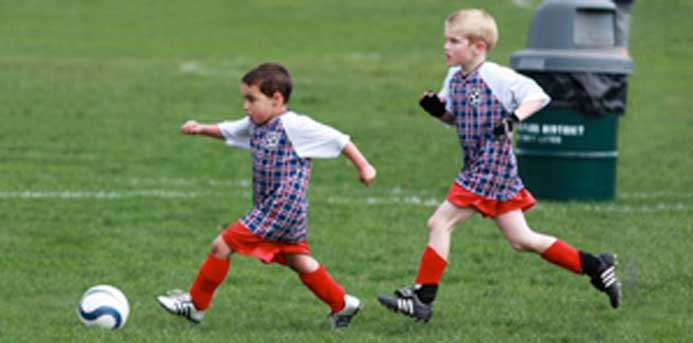Summer is the time to relax and take a break from life’s frenetic pace. But for our kids, summer is often the time to “get ahead.”
Whether it’s doing math drills or endless sports camps, kids are being pushed too hard and not getting the break they deserve.
So before you sign your daughter up for one more basketball camp, think about how you’re really going to keep her in the game.
Avoid Mental Burnout
According to the National Alliance for Sports, each year 20 million children sign up for competitive sports. By age 13, 70 percent of these kids quit playing. Why? It stopped being fun.
“We’re really seeing the negative effects of the so-called helicopter parents,” explains Dr. Stacy Clark, a licensed clinical psychologist with Insight Illinois who specializes in treating issues encountered by athletes. “Kids are playing a sport to please their parents and coaches, not themselves. If they don’t make the top team, win the championship, even get the college scholarship, they feel like they’re letting them down.” She says that as a result, they spend too much time dedicated to a single sport and put all their self-worth and identity on this one facet of their life.
Use Summer to Build Self-Esteem
Summer is the perfect time to cultivate other “identities.” Whether it’s trying a new sport, going to a traditional summer camp, or getting a job, all of these build self-esteem.
For younger athletes, keep sports fun. Instead of scheduling practice games and drills, encourage pick-up games with friends. Keep in mind your child’s developmental level and know what’s reasonable to expect in terms of muscle coordination, dedication or attention span.
Staying Fit
Taking a break for the summer doesn’t mean becoming a couch potato.
“We encourage players to use their time off ice to do different things,” explains Kyle Wallack, Associate Head Coach of Men’s Ice Hockey at Yale University. “Cross training gives athletes an opportunity to develop skills across the board, while maintaining speed and stamina.”
Too often Wallack sees parents forcing their kids to choose a sport too early and putting all their emphasis on developing specific skills. “At 10 years old, it’s impossible to know what your child is going to excel at, let alone want to do,” he says. “Your focus should be on letting your child be an overall athlete, doing different sports and building a range of skills. If and when they want to get serious about a specific sport—and it’s their passion not yours—that’s the time to specialize.”
Preventing Overuse Injuries
Above all, play it safe. In early 2007, the American Orthopaedic Society for Sports Medicine (AOSSM) initiated the STOP Sports Injuries campaign in an effort to raise awareness and prevent athletic overuse and trauma injuries in youth athletes. The website provides extensive resources on prevention and treatment of sport-specific injuries.
Both Wallack and Clark recommend athletes (and parents) work with coaches to come up with a summer plan. In addition to building athletic prowess, that plan should take into account the psychological needs of an athlete. “Motivation and focus are huge factors in an athlete’s performance,” reminds Clark. “Taking a break mentally from a sport is just as important to preventing burn-out.”

